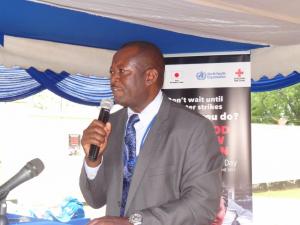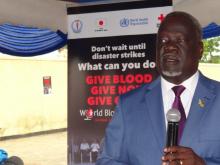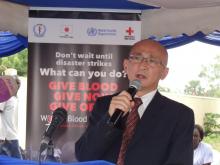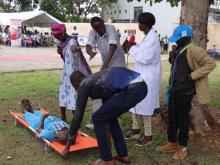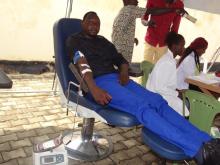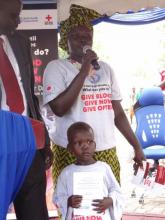South Sudan Marks World Blood Donor Day 2017 Under the Theme: What can you do? Give blood. Give now. Give often
Juba, 14 June 2017– South Sudan on 14 June 2017 joined the rest of the world in marking the World Blood Donor Day under the theme: “What can you do? Give blood. Give now. Give often” to emphasize the significance of voluntary and regular blood donation and maintain adequate supplies and achieve a national self-sufficiency of blood; strengthen the emergency preparedness of health services in the community by donating blood and thank individuals who donate blood regularly and encourage young people to become new donors.
To celebrate the day and translate this year’s theme to the local context, WHO in collaboration with MOH and partners conducted various activities. These include bulk simple and short text messages (SMS) by telecom companies and followed by a series of TV and Radio talk shows to create public awareness of the need for committed voluntary and regular blood donation; marching; song with this year’s theme performed by local artist; speeches, testimonies by regular blood donors and a recipient and drama on blood donation.
Addressing guests at the commemoration, Dr Makur M. Kariom, the Undersecretary at the Ministry of Health, highlighted the importance of donating blood and how it can save the lives of others. He also encouraged participants to donate blood to help save more lives.
Since the establishment of the National Blood Transfusion Centre (NBTS) in 2014, there has always been a strong focus on promoting voluntary blood donation, and the significance of the life-saving act of giving blood has been emphasized at every opportunity.
The address of the WHO Regional Director for Africa, Dr Matshidiso Moeti was read by Mr Evans Liyosi on behalf of Dr Abdulmumini Usman, the WHO Representative to South Sudan. In the speech, Dr Moeti called on countries and stakeholders involved in blood donations to support and strengthen advocacy for voluntary, unpaid blood donations to maintain adequate supplies of safe blood.
On behalf of the Ambassador of Japan to South Sudan, H.E. Kiya Masahiko, Mr Shigeru Hamano, the Deputy Chief of the Japanese Embassy in South Sudan, emphasized the significance of voluntary and regular blood donation to save lives and improve the health of South Sudanese most affected by the crises and disease outbreaks. He pledged the continued commitment of the Government of Japan in partnership with WHO to supporting the people and government of South Sudan in areas related to health emergencies in populations affected by the ongoing crisis.
In his speech the Honorable Minister for Health Dr Riek Gai Kok, commended the contributions of the people and Government of Japan and the commitments of WHO and partners to expand the blood safety programme so as to establish efficient and sustainable national and regional blood transfusion services that can assure the quality, safety and adequacy of blood and blood products to meet the needs of deserving patients since 2014. Dr Kok also thanked and awarded the superhero blood donors who make a difference in the community and urged participants to wear the campaign T-shirts and caps for the coming three days to help spread the word about World Blood Donor Day!
Among the awardees honoured on 14 June are the Ambassador of Japan to South Sudan, H.E. Kiya Masahiko and Mr Evans Liyosi, a Technical Officer at WHO South Sudan who has donated blood regularly. During the Blood Donor Day 100 voluntary donations were collected in Juba and another 23 units in Torit hospital, former Eastern Equatoria State.
WHO with funding from the Government of Japan, has strengthened the overall humanitarian response including the blood transfusion safety to provide lifesaving services in South Sudan since 2014.
Also in attendance were Ms Veronica Kenyi, Head of Programmes representing the Secretary General for the South Sudan Red Cross; Dr Blaze Karibushi Project Coordinator Advisor GFTAM UNDP ; Dr Rafi Ulla, Country Representative for Swiss Red Cross and officials of the Ministry of Health, volunteers, members of the blood donation and recipient communities among others.




